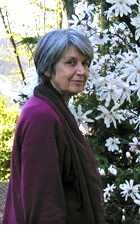 On Friday 19 April 2013, Dr. Luisa Passerini, Professor Emeritus of Cultural History at the University of Turin and External Professor of History of the 20th Century at the European University Institute, Florence, will give a public talk entitled “European Identity in Post-Colonial Perspective.” The lecture will be held at the National Museum, Lecture Hall, at 14:00. The lecture is hosted by EDDA – Center of Excellence in collaboration with the Institute of International Affairs at the University of Iceland.
On Friday 19 April 2013, Dr. Luisa Passerini, Professor Emeritus of Cultural History at the University of Turin and External Professor of History of the 20th Century at the European University Institute, Florence, will give a public talk entitled “European Identity in Post-Colonial Perspective.” The lecture will be held at the National Museum, Lecture Hall, at 14:00. The lecture is hosted by EDDA – Center of Excellence in collaboration with the Institute of International Affairs at the University of Iceland.
Abstract:
To be European today means positioning oneself within the historical contradictions of European identity and experiencing the political need to turn them into spaces of a critique of traditional identities understood as exclusive and hierarchic. This challenge must be updated to the present situation of Europe in global and postcolonial perspective, taking into account possible future-oriented forms of identity for non-native Europeans.
About the Speaker:
Luisa Passerini, who is currently, a visiting professor in the Oral History Master Program at Columbia University in New York, is an oral historian, writer, and professor of history. She began her career as a researcher in Tanzania and Zambia. Returning to Italy, she became involved in the movements of the late 1960s and 1970s, particularly the feminist movement, about which she has written a memoir, Autobiography of a Generation. She has taught in Australia, Germany, and the United States, as well as in Italy, where she is a retired Professor of History at the University of Turin, and External Professor of History of the 20th Century at the European University Institute, Florence.
Passerini is the author of seven books and the editor of eight. She has done pioneering oral history work on the World War II period, focusing on themes of memory and the Resistance; fascism and the working class; and from 1993 to 2010 she has been working on a project on the relationships between the discourses on Europe and on love in Britain, France, and Italy in the 20th century, with particular attention to the period between the wars. In recent years, Luisa Passerini has started a new project intending to study intercultural connections in contemporary Europe, engaging both native and “new” Europeans and using especially visual sources. These intercultural connections are woven through the faculties of embodied subjects – memory, visuality and mobility – and concern the movement of people, ideas and images across the borders of European nation-states.
Luisa Passerini’s research has followed some major themes as connecting threads through various fields. She has studied the history of the subjects of social and cultural change, from the African liberation movements to the movements of workers, students, and women in our century. In this endeavor she has largely used memory in its oral form, as expressed through interviews and testimonies, for constructing a history of Fascism under a new perspective as well as a history of gender and generation identities. Memory, understood in a large sense as an epoch’s heritage of the past in its various forms, has been the object of her writings on the methodology of history and on the relationships between history and the social sciences. In the field of methodology she has given particular attention to the links between sources, objects and methods, and to the interpretation of sources for a history of subjectivity.
